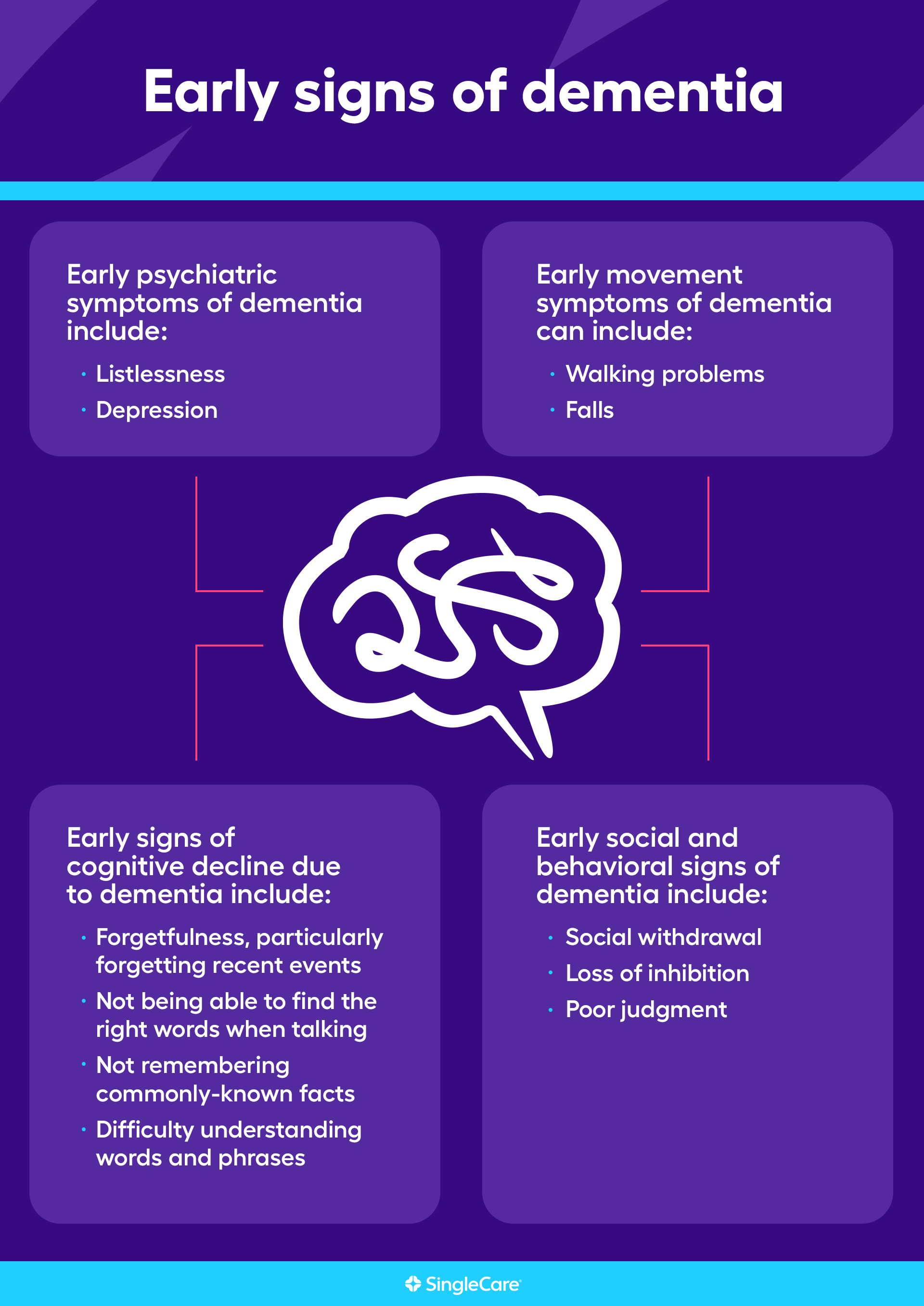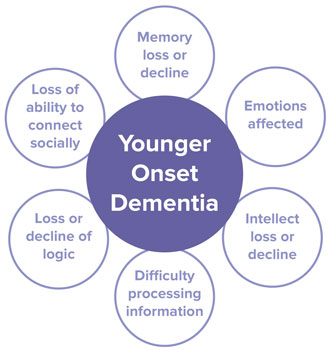Key Differences Between Vascular Dementia and Alzheimer's Disease
Key Differences Between Vascular Dementia and Alzheimer's Disease
Blog Article
Comprehending the Effect of Dementia on Daily Life and Caregiving
Mental deterioration affects day-to-day life in profound means, affecting not just those detected yet also their caretakers. As cognitive decrease progresses, you might see changes in communication and routine that obstacle both parties. Comprehending these shifts is essential for preserving dignity and involvement. Just how do you adapt your caregiving approaches to support a person traversing this complicated journey? The answers could amaze you as we explore the nuances of this experience.
The Phases of Mental Deterioration and Their Effects on Every Day Life
As you browse the trip of dementia, understanding its stages can markedly affect exactly how you take care of every day life. Dementia normally proceeds through three main stages: early, middle, and late. In the onset, you could notice occasional memory gaps or trouble finding the ideal words. This can lead to frustration, but recognizing these indicators early aids you adjust your regular and seek support.
During the center stage, you'll experience more recognizable cognitive decline. Daily jobs might become difficult, and keeping your freedom may require modifications. Using pointers and streamlining your atmosphere can assist.
In the late phase, people typically need considerable support with everyday tasks. Planning for treatment comes to be vital, concentrating on comfort and lifestyle. By understanding these stages, you're better geared up to respond proactively, guaranteeing you or your loved one can navigate the difficulties with self-respect and elegance.

Modifications in Communication and Social Communication
Just how do changes in communication affect your day-to-day communications as dementia advances? As dementia advances, you may see that basic conversations come to be tough. Words might escape you, or you might have a hard time to locate the appropriate phrases. This can lead to frustration for both you and your enjoyed ones. Nonverbal hints, like gestures or face expressions, come to be increasingly crucial.
You may locate it less complicated to link through these ways instead of counting entirely on talked language. Paying attention abilities can additionally alter; you might discover it harder to follow conversations or keep in mind what was simply claimed (Early Onset Dementia). This can cause misconceptions or sensations of seclusion
Urging perseverance and producing a supportive setting can assist. Taking part in activities that foster link, like music or art, can boost social communications. Remember, preserving connections is still feasible; it's nearly adjusting to new ways of connecting.
Effect On Daily Routines and Activities
While maneuvering everyday routines, you'll likely see that tasks you as soon as finished effortlessly come to be extra difficult as dementia progresses. Straightforward activities like cooking, dressing, and even bathing may need even more effort and time. You may locate yourself neglecting actions in acquainted regimens or struggling to remember where you positioned items. This can result in irritation not simply for you, but also for those around you.
Planning your day can really feel frustrating, making it more challenging to stay with a timetable. You may need tips for consultations or to take medications. Adapting your atmosphere can assist; as an example, classifying items or utilizing lists can simplify jobs. Taking part in recurring, structured activities can also give comfort and a sense of achievement. Remember, it's fine to request for aid. Bordering on your own with helpful close friends or household can make taking care of these modifications a little bit less complicated.
Behavioral and psychological Challenges
Steering through day-to-day routines can bring around not simply sensible obstacles, yet behavior and likewise psychological ones. You might observe adjustments in state of mind, such as boosted anxiousness or frustration, which can stem from complication or difficulty in finishing jobs. As you browse these minutes, it is crucial to acknowledge that your loved one may express their sensations via actions like frustration or withdrawal.
These psychological reactions can be unforeseeable and might occur without caution, leaving you both sensation bewildered. You may discover that acquainted settings or regimens can help reduce anxiousness, yet preserving persistence ends up being substantial. It is very important to validate their sensations, also if you don't totally understand them.
The Duty of Caregivers in Sustaining People With Dementia
As a caregiver, you play a vital duty in giving emotional support for people with mental deterioration. Developing day-to-day care regimens can create a feeling of security and convenience, helping to relieve their anxiousness. By recognizing their needs and using reliable strategies, you can considerably improve their quality of life.
Psychological Support Approaches
When looking after a person with mental deterioration, recognizing the psychological landscape is important for giving effective support. You'll often find that patience and compassion go a browse around this site lengthy method. Validate their feelings; if they express complication or frustration, recognize it without disregarding their emotions. Simple gestures, like holding their hand or keeping eye contact, can create a sense of safety. Attempt to participate in activities that they enjoy, as this can stimulate joy and connection. Bear in mind to communicate clearly and gradually, making use of a calm tone. Urge expression via songs or art, which can act as an effective outlet. Ultimately, do not fail to remember to look after your own emotional requirements; looking for assistance on your own can boost your capacity to look after them.
Daily Care Routines
Developing daily treatment routines is important for supplying stability and comfort to people with dementia, as these regimens can help in reducing confusion and anxiousness. You can start by outlining a regular routine for meals, tasks, and remainder. This predictability assists your loved one feel more secure and engaged.
Integrate acquainted jobs, like folding laundry or watering plants, which can evoke positive memories and promote a feeling of success. Use visual cues, such as schedules or lists, to direct them via the day.
Be flexible, though; adapt routines as needed based on their state of mind or power levels. Fall Risk. Remember, your perseverance and understanding are vital in maneuvering their altering demands, ensuring they feel sustained and valued throughout their day-to-day life
Producing a Safe and Comfy Living Environment
Developing a risk-free and comfy living environment is necessary for individuals with dementia. You'll wish to make home security adjustments that minimize dangers and assure knowledge to provide a sense of comfort. By concentrating on these elements, you can assist produce a room that supports both safety and wellness.
Home Security Alterations
As you navigate the challenges of mental deterioration, making home safety and security adjustments can considerably enhance comfort and protection. Begin by getting rid of tripping dangers like rugs and mess, ensuring walkways are clear. Set up grab bars in restrooms and non-slip floor coverings in the shower to stop drops. Think about utilizing brighter lights and evening lights to boost visibility, particularly throughout nighttime. Label essential areas, such as the restroom and cooking area, with clear indications to help with alignment. Protect any sharp items or harmful materials out of reach. In addition, examine your home's locks and alarm systems to confirm they're user-friendly and give assurance. These modifications not just advertise safety but additionally urge self-reliance, allowing your loved one to really feel even more at ease in their setting.
Convenience and Familiarity
After making certain a risk-free setting with essential modifications, promoting convenience and knowledge is necessary for people with dementia. Start by customizing their area. Usage acquainted shades, decors, and pictures that evoke happy memories. A favorite blanket or chair can give a complacency. Preserve a constant regular to aid them feel grounded and lower stress and anxiety. Basic, familiar dishes can also produce a reassuring atmosphere. Keep paths clear and clutter-free to avoid complication. Incorporate soft lights, as bright lights can be disorienting. Take into consideration adding relaxing fragrances, like lavender, to advertise relaxation. Taking part in acquainted tasks, such as paying attention to click resources songs or horticulture, can improve their sense of belonging, making their living atmosphere a real shelter.
Strategies for Reliable Caregiving and Assistance
While navigating the challenges of mental deterioration treatment can really feel frustrating, implementing effective techniques can considerably boost both the caretaker's and the person's day-to-day experience. Begin by establishing a routine; predictability helps in reducing anxiety for both you and your enjoyed one. Use clear, straightforward communication-- direct questions and brief sentences can prevent complication.

Do not fail to remember to deal with yourself; schedule breaks and attach with support groups. Sharing experiences with others in comparable circumstances can provide valuable understandings and emotional alleviation.
Last but not least, remain person and versatile. Dementia can bring uncertain modifications, so adapting your technique is necessary. By employing these strategies, you can promote a more favorable environment that profits both you and your liked one.
Frequently Asked Inquiries

What Are the Various Kinds of Mental Deterioration?
You'll find a number of sorts of dementia, including Alzheimer's, vascular dementia, Lewy body dementia, and frontotemporal dementia. Each type influences memory and cognitive function differently, so understanding the differences is necessary for correct medical diagnosis and treatment.
Just How Can I Aid Someone With Early-Stage Dementia?
You can assist someone with early-stage dementia by holding your horses, offering assistance, and encouraging them to participate in activities they enjoy. Maintaining routines consistent and keeping open interaction can also make a significant distinction in their every day life.
Exist Financial Resources Available for Mental Deterioration Care?
Yes, there are economic sources available for mental deterioration treatment. You can explore entitlement program programs, nonprofit companies, and insurance coverage options. It's additionally smart to seek advice from local agencies for specific resources customized to your circumstance.
What Legal Factors To Consider Should Caregivers Know?
As a caretaker, you must consider power of lawyer, healthcare proxies, and guardianship regulations. It's necessary to understand the lawful rights and obligations you hold, guaranteeing your liked one obtains suitable care and defense.
How Can I Deal With Caretaker Anxiety?
You can handle caregiver anxiety by focusing on self-care, seeking assistance from buddies or teams, establishing realistic expectations, taking breaks, and exercising leisure techniques. Keep in mind, your health matters equally as long as the individual you're caring for.
Comprehending the Effect of Mental Deterioration on Daily Life and Caregiving.
As you navigate the journey of mental deterioration, understanding its stages can considerably influence how you handle daily life.While navigating day-to-day regimens, you'll likely notice that jobs you once finished easily become much more tough as mental deterioration advances.Developing daily treatment routines is essential for giving stability and convenience to individuals with mental deterioration, as these routines can help minimize complication and stress and anxiety.While steering the obstacles of dementia treatment can really feel overwhelming, carrying out effective methods can Clicking Here greatly enhance both the caretaker's and the individual's daily experience.
Report this page